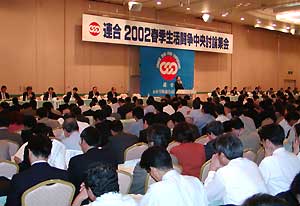|
|
| Photo:
A lively discussion took place. (11/1, Tokyo) |
On November 1st and 2nd, RENGO held its
2002 Spring Struggle Central Deliberation Rally at a hotel in Tokyo. In the midst
of a drastic 5.3% increase in the unemployment rate this September and fears that
the situation will worsen in the future, approximately 650 participants gathered
for the rally. At the rally the next Spring Struggle was defined as a struggle
that would be meant to save employment and living standards, and then it was endorsed
that RENGO would expend all of its might to maintain and stabilize employment
from next autumn. The “2002 Spring Struggle Basic Concepts” discussed
at this rally are scheduled to be submitted to the 36th Central Committee as the
“Struggle Principle.”
President Sasamori gave an opening speech touching on pressing issues during
the November 1st meeting. In his remarks, Sasamori revealed his oppositional stance
toward Prime Minister Koizumi’s Structural Reform saying, “it lacks
even the slightest spark of concern for the labor side. Unless we strategically
confront [the government’s reform] the government will beat us down as it
sees fit.” Continuing on to the government’s employment improvement
plans he said, “the supplementary budget plan fails to function even as lip
service. The 5.3% unemployment rate was far worse than what was expected—and
the numbers have even startled us. The government must change its policies to
improve employment.” Sasamori also revealed plans for a nationwide campaign
drive in which he himself will tour each prefecture to promote the slogan “Stop
Unemployment.”
Further, he explained that the 2002 Spring Struggle “is not just about <jobs
or wages> or even just <jobs and wages>. The biggest problem to be solved
will be how to create a relation between employment and wages if we are able to
save jobs—this will be not easy.” He reported that NIKKEIREN and RENGO
have jointly established a work-sharing study committee and that “we will
promote discussion in time for spring wage negotiations, aiming for consensus
building among government, labor and management.”
Each related committee reported on the Basic Concepts, RENGO SOREN (Research Institute
for Advancement of Living Standards-RIALS) President Kuribayashi reported on the
“Current conditions and problems of Japanese economics” and following
him, General Secretary Kusano proposed the Basic Concepts. At the plenary session,
fourteen attendees from twelve organizations (eight affiliates and four local
RENGO) commented on a variety of themes including the place of the Spring Struggle,
wage-raise demand standards, part-time work, small to mid-sized unions, and gender-equal
participation.
The major points of the question and answer session were presented as follows.
On the place of the Spring Struggle: “maintaining employment along with attaining
maximum distribution of results are necessary in order to check deflation.”
(JIDOSHA SOREN: Confederation of Japan Automobile Workers’ Unions). “We
should show that securing jobs is a common issue and all of RENGO should intensively
work on it during the Spring Struggle.” (JOHO ROREN: Japan Federation of
Telecommunications, Electronic Information and Allied Workers). Regarding the
Employment Stabilization Declaration: “negotiation at unions where payment
system is not organized might be difficult if labor highlights the declaration.”
(KOTSU ROREN: Japan Federation of Transport Workers’ Unions). On work sharing:
“unless we formulate a cohesive opinion we run the risk of public opinion
believing that labor is <allowing wage cuts>.” (ZENKOKU IPPAN: National
Union of General Workers).
On wage-raise demand standards such as ‘wage curve maintenance portions plus,’
doing away with the term ‘base salary raise’: “small to mid-sized
unions feel there is a need to have specific demand standards.” (ZENKOKU
IPPAN: National Union of General Workers). “We realize that this principle
will also include industrial federations which work to demand base salary raises.”
(JIDOSHA SOREN: Confederation of Japan Automobile Workers’ Unions). On improvement
of part-time workers’ conditions: “if RENGO is working on wage-raises
for non-union organizations including part-time workers then it needs to show
some substance. Likewise, how to diffuse an intra-firm minimum wage for unorganized
workers is a challenge. (ZENKOKU IPPAN: National Union of General Workers).
Hearing these opinions Sasamori said, “including concealed unemployed and
others, the unemployment rate now exceeds 10%. Employment security within our
own circles alone is not enough.” Continuing, he said, “it is indispensable
to secure employment to increase personal consumption and bring the economy back
on track. We must establish these fundamentals.” Then he emphasized, “maintaining
employment is the biggest issue, yet we will continue to demand payment for labor.
We will never let pay cuts happen.”
On the second day, participants separated into two sessions—the first was,
“To maintain and secure employment” and the second was “Improving
treatment of part-time workers and others” where they actively exchanged
opinions.
|
